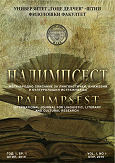SISTER CARRIE: TRAITS OF DREISER’S SELF-IDENTIFICATION
SISTER CARRIE: TRAITS OF DREISER’S SELF-IDENTIFICATION
Author(s): Mihrije Maloku-MorinaSubject(s): Novel, Theory of Literature, American Literature
Published by: Универзитет »Гоце Делчев« - Штип
Keywords: American life; American dream; material success; spiritual values; impact.
Summary/Abstract: This research paper aims to analyse Theodore Dreiser’s novel Sister Carrie and its depiction of American life, social problems and the harmful impact of material success on individual values. The study uses a qualitative research method that involves a close reading of the novel, as well as an examination of Dreiser’s biographical and critical sources. The most significant findings suggest that Dreiser’s novel portrays the loss of spiritual values, wisdom, wit and nobility of heart as a consequence of the pursuit of material success. Moreover, the study reveals that Dreiser’s style is characterized by logical integrity, subtle contrasts, beautiful detail descriptions, timing, diversified rhythm and digression. Dreiser’s symbols provide insights into the true essence of social phenomena, demonstrating his profound knowledge of society. Ultimately, Sister Carrie serves as a powerful document that sheds light on the “amorality” of the American way of life, which incited a denigrating campaign against Dreiser by critics. The research concludes that the novel highlights the dangers of the American dream and the importance of preserving spiritual values amidst the pursuit of material success. This study’s findings suggest that Sister Carrie remains relevant to contemporary society, as it continues to raise questions about the American Dream and its impact on individuals and society.
Journal: Палимпсест, Меѓународно списание за лингвистички, книжевни и културолошки истражувања
- Issue Year: 8/2023
- Issue No: 16
- Page Range: 107-116
- Page Count: 10
- Language: English

